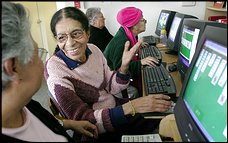Millions Not Joining Medicare Drug Plan

Despite Outreach, Poor Seniors Miss Out On Low-Cost Coverage
By Ceci ConnollyWashington Post Staff WriterTuesday, February 21, 2006; Page A01
A $400 million campaign by the Bush administration to enroll low-income seniors in prescription drug coverage that would cost them just a few dollars per prescription has signed up 1.4 million people, a fraction of the 8 million eligible for the new coverage.
At this rate, by some calculations, the government is on track to spend about $250 for each person it enrolls, and even then it would have only 2 million poor senior citizens taking advantage of what is perhaps the most generous government benefit available today.
"It's a very, very good benefit," said Deane Beebe, whose organization, the Medicare Rights Center, has been critical of many aspects of the new Medicare drug program, called Part D. "It's probably the best thing about Medicare Part D, except that most people don't know about it or don't know how to apply for it or are not comfortable or capable of applying."
When Congress enacted the first-ever drug plan for Medicare's 42 million beneficiaries, it created a tiered system in which the poorest and sickest seniors pay the least. About 6 million elderly and disabled people were switched from state Medicaid programs to virtually free Medicare coverage. Retirees at the high end of the income scale have the option of purchasing a plan with standard out-of-pocket costs such as monthly premiums, deductibles and co-payments.
The group sandwiched in between -- those earning too much for Medicaid but less than $19,000 -- qualify for coverage with no premiums, no deductibles and co-payments of less than $5. Congress gave the Social Security Administration $500 million primarily to identify and enroll them.
But as in earlier efforts to register low-income Americans in programs such as food stamps or children's health insurance, officials have encountered myriad challenges. The group of seniors eligible for the subsidies dubbed "extra help" tend to move often, may not speak English, sometimes suffer from mental impairments or do not want what they perceive to be a government handout.
Across the nation, the administration has turned to hundreds of community groups to help sign people up. At the Educational Organization for United Latin Americans in the District's Adams Morgan neighborhood, Mirian Barrios brings clients to her computer and makes her pitch, usually in Spanish. Explaining the program, collecting financial data for the application and finally choosing a drug plan often takes four one-on-one meetings, she said.
"I have more trouble signing people up for the extra help," Barrios said. "They don't want to release information like their bank statements or they are afraid they will lose some of the benefits they already have."
Digna Tate, a 72-year-old Cuban American who speaks English and has been in the United States for decades, said she was intimidated by the whole process. "If it weren't for Mirian, I wouldn't have the Medicare plan," she said, after eating lunch at the center.
Even Medicare chief Mark McClellan acknowledged that it is difficult marketing to this skeptical group. "Some people think it's too good to be true," he said in an interview.
The task has proved to be so daunting for the Social Security Administration (SSA) that one high-ranking official wrote a desperate e-mail this month describing overwhelmed telephone lines, heavy backlogs, and visits to field offices that jumped from 140,000 people a day in the fall to 200,000 in January.
"Those of you on the front line have been expressing your deep concern that SSA is not positioned well to help people understand, enroll in and negotiate" the discount drug program, wrote Linda McMahon, deputy commissioner of operations. "Now we are seeing the consequences of that fact.
CONTINUED 1
document.write('2')
22
document.write('Next')
NextNext >
Link Here




0 Comments:
Post a Comment
<< Home